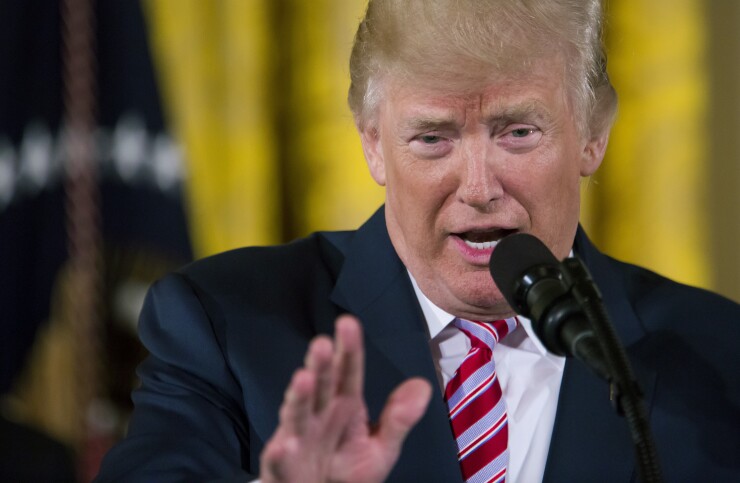Want unlimited access to top ideas and insights?
WASHINGTON — President Trump may have to wait until January to sign the sweeping overhaul of the nation’s tax system that cleared Congress midday Wednesday in order to postpone to 2019 across-the-board spending cuts — including federal subsidy payments for Build America Bonds and other direct-pay bonds.
Once Trump signs the bill, it could trigger a requirement in the Pay-As-You-Go Act of 2010 for the Office of Management and Budget to order billions of dollars of cuts in mandatory federal programs. This would include a $25 billion cut to Medicare and most other federal programs, the nonpartisan Congressional Budget Office told House Minority Whip Steny Hoyer, D-Md. in November.

If Trump signs the tax bill this year without a waiver from the PAYGO Act, OMB would have to order a $136 billion cut in mandatory federal programs, wiping out federal subsidies for BABs and other direct-pay bonds.
The across-the-board spending cuts would be triggered because the tax bill will add almost $1.5 trillion in new deficits over 10 years, according to the Joint Committee on Taxation.
National Economic Council Director Gary Cohn said at an event Wednesday morning sponsored by Axios that the administration is hoping that the PAYGO Act cuts will be waived as part of a short-term continuing resolution to keep the federal government operating past Dec. 22.
“If we can get pay-go waived in the CR, we will sign the tax bill this year,” Cohn said.
If there isn’t a consensus on waiving pay-go, Trump has the option of waiting to sign the tax legislation until January to postpone the mandatory cuts until 2019.
PAYGO Act concerns were raised by Democrats during the debate over the tax law. But Senate Finance Committee chairman Orrin Hatch, R-Utah rebuffed them saying there has never been a PAYGO problem before with legislation.
Republicans had hoped to pass separate legislation that would waive the PAYGO requirements. Earlier this week they included a waiver of the PAYGO Act in a continuing resolution that included $81 billion emergency disaster aid.
But Hoyer said in an interview on Fox News Tuesday night, “We’re not necessarily signing on to that at this point in time. We’ll see what they do.”
Democrats have been angry that they had no input on the tax bill. It was negotiated and agreed to by House and Senate Republicans.
The tax overhaul cleared the House midday Wednesday by a vote of 224 to 201 along party lines, with several members absent who voted for the bill earlier on Tuesday.
This was the second House vote on the legislation before members realized several provisions would violate the Byrd Rule in the Senate. That rule prohibits any legislation from adding to the deficit after more than 10 years.
The House had voted for the tax bill by a vote of 227-203 before those provisions were removed. One provision would have allowed home schooling expenses to be paid for from tax sheltered 529 savings accounts. Another involved the criteria used to determine whether the endowments of private universities are subject to the legislation’s new excise tax. A third was the name of the bill.
The Senate passed the bill at 12:45 Wednesday morning by a vote of 51 to 48 before the second House vote.
If President Trump doesn’t sign the bill until January, it would not affect the provision on terminating advance refundings, which has an effective date of after Dec. 31. The bill would also hurt the muni market by dropping the corporate tax to 21% from 35% and making munis more competitive with taxables as well as less attractive to banks, property and casualty insurance companies and life insurance companies.
The alternative minimum tax paid by individuals, which has been a deterrent to muni investments, will be scaled back under the legislation to individuals earning more than $500,000 and married couples with incomes over $1 million. That’s good news, but the new top rate on individual taxes of 37% is lower than the current top rate of 39.6%.
Democrats criticize the bill for helping corporations and the wealthy at the expense of the middle class..
“The rich will get richer, the poor will get poorer and the middle class will get shafted,” said Rep. Danny Davis, D-Ill.
Republicans call it a Christmas present that will give the family earning the median household income a $2,059 tax cut in 2018, foster faster economic growth and make American businesses more competitive internationally.
“Our tax code is so broken that it undermines the very things that have made our country great in the first place,” said Speaker Paul Ryan, R-Wis.
However, the Tax Policy Center, a nonpartisan Washington think tank, estimates middle-income taxpayers receive a tax cut of under $900 while households in the top 1% of income earning more than $733,000 would get a tax cut of about $50,000.
State and local governments also face additional fiscal constraints in the future because the deduction for state and local taxes will be limited to $10,000 for property taxes and either sales taxes or state and local income taxes.
That’s led to predictions of lower home values and that many homeowners in high tax states such as New York, New Jersey and California will face higher taxes.
Eleven of the 12 Republicans who voted against the bill in the House are from those three states.





